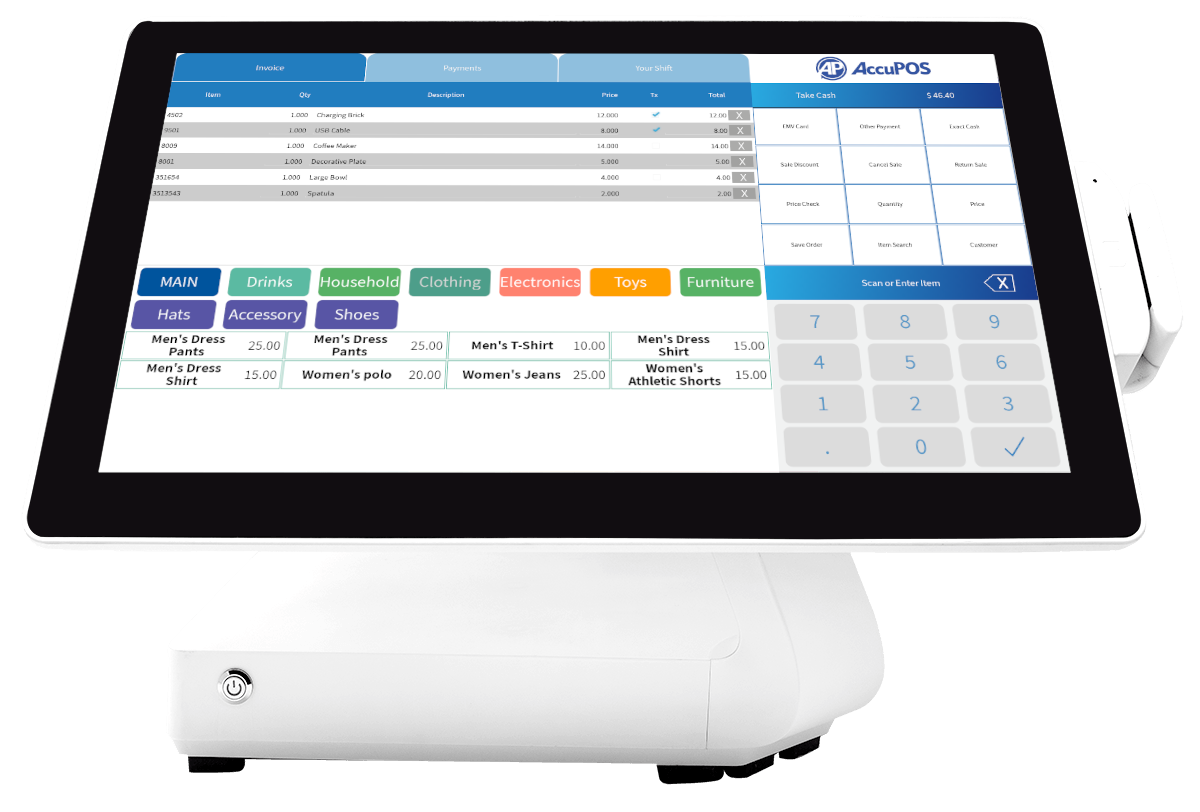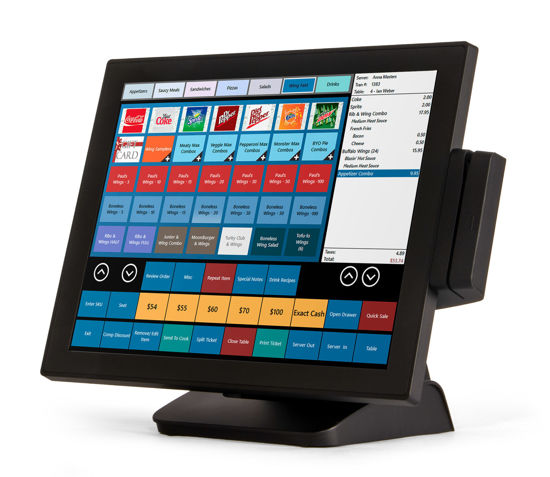Get This Report on Point Of Sale Systems
Point Of Sale Systems for Beginners

Point of Sale Software: Retail Point-Of-Sale Solutions Streamline Deals
Excitement About Pos Systems

Hardware Parts of a Point of Sale System What makes a POS system tick? It's not just software application; the hardware plays a starring function. Believe of it as the body to the software's brain. Without the ideal hardware, even the most sophisticated POS software is simply a pretty face. Essential POS Hardware So, what are the must-haves? Let's break it down. The central processing unit, frequently a computer system or tablet, is the heart of the operation. The display or touchscreen display allows personnel to connect with the system. A barcode scanner accelerate the checkout process. Remember the days of by hand entering each code? The dependable receipt printer supplies consumers with a record of their purchase. A money drawer keeps your money safe and organized. A card reader allows customers to pay with credit or debit cards. Diving Deeper: Beyond the Essential However wait, there's more! Depending on your service, you may require specific hardware. A dining establishment website may integrate cooking area printers to relay orders, while a retail shop might use label printers for item tagging. Ever question how your local bakeshop immediately prints those delicious-looking labels? Selecting the Right Hardware: A Balancing Act Selecting the ideal hardware isn't almost buying the most expensive equipment. It's about discovering the sweet spot in between functionality, resilience, and budget. A small company simply starting may go with a more basic setup, while a high-volume merchant will need robust, high-performance machines. Is it better to buy brand-new or utilized? Consider your choices carefully. A new system uses the most recent technology and guarantee security, however a refurbished system can save you money. The Future of POS Hardware What does the future hold? Expect to see much more integration with mobile phones, biometric scanners for worker authentication, and advanced analytics control panels displayed on bigger, clearer screens. Picture a world where inventory is immediately updated in real-time as products are scanned-- a world where you can track your best-selling product from throughout the world. The possibilities are unlimited, and the hardware is continuously evolving to meet the needs of today's businesses. Are you all set to upgrade your point of sale system?
Software Application Features and Capabilities: The Heart of Your POS System
Ever watch a skilled barista glide through a hectic early morning rush? Their trick isn't just caffeine; it's a smooth dance with their POS system. The software application is the conductor of your service symphony, managing whatever from sales to stock. What notes should you be listening for? What abilities truly matter in today's market?
Stock Management: Beyond Counting Beans
Forget spreadsheets that haunt your dreams. Modern POS systems use real-time stock tracking, notifying you when your stock of artisanal coffee beans dips precariously low. Think about it as a digital guardian angel, preventing those awkward "Sorry, we're out!" minutes to consumers. What if you could also anticipate demand based upon historic information? Lots of systems now use forecasting tools, a powerful weapon against overstocking and lost sales. This assists prevent the dilemma of lacking popular items or collecting excess inventory of slow-moving items, both of which can constrain money flow and area.
Sales Reporting and Analytics: Deciphering the Information
Sales information is the new gold, and your POS system is the miner. Forget simply understanding how much you sold today. Dive deep into the information to discover patterns, identify your very popular items, and comprehend customer behavior. Which menu product sets perfectly with the day-to-day special? Which promo resonated most with your clients? These insights are not just interesting; they're actionable intelligence. Without reliable sales reporting, navigating the intricacies of organization decision-making becomes like cruising without a compass, increasing the chance of errors and missed opportunities.
Consumer Relationship Management (CRM): Structure Bridges, Not Walls
Keeping in mind a regular client's name and preferred order is lovely, but scaling that personal touch is tricky. POS systems with CRM abilities enable you to track customer purchase history, preferences, and even birthdays. Think of automatically providing a discount on their birthday-- a little gesture that cultivates loyalty and encourages repeat organization. However there is the prospective snag of poor data quality, which can cause incorrect customer profiles and inefficient marketing efforts.
Payment Processing: Improving the Transaction
The checkout experience can make or break a sale. Seamless combination with numerous payment methods-- charge card, mobile wallets, even copyright-- is non-negotiable. Can your system deal with split payments? Does it provide safe and secure tokenization to secure client data? A clunky payment process resembles hitting a sour note in your organization symphony, potentially interfering with the entire performance. Ensuring compatibility with evolving payment technologies and adherence to security requirements are critical for maintaining client trust and operational efficiency.
Worker Management: Keeping the Team in Sync
From clocking in and out to handling permissions and tracking performance, employee management includes enhance operations and improve responsibility. Is scheduling a nightmare? Many POS systems provide incorporated scheduling tools, enhancing staffing levels based on anticipated demand. A typical obstacle that is frequently overlooked is the difficulty of incorporating staff member management functionalities with payroll systems, which can result in errors and ineffectiveness in wage estimations.
Advanced Features: Leveling Up Your Operations
- Table Management: Suitable for dining establishments, this function permits you to picture your dining-room, track table status, and manage appointments.
- Commitment Programs: Reward your finest customers and encourage repeat company with integrated loyalty programs.
- Online Purchasing Integration: Seamlessly incorporate your POS system with online buying platforms to broaden your reach.
Choosing the best POS system is about more than simply performance; it has to do with discovering a partner that can grow with your company. Consider your current requirements, anticipate future development, and do not hesitate to ask the hard questions. The best software can transform your company from a disorderly cacophony into a harmonious work of art.
Industry-Specific POS System Applications
Think of the regional bakeshop, dynamic with morning consumers yearning fresh croissants. A generic POS system might manage transactions, however can it handle complex recipes, track active ingredient inventory, or automatically adjust production schedules based on sales data? Most likely not. That is where the beauty of industry-specific POS systems shines.
Dining establishments and Hospitality
For dynamic dining establishments, speed and accuracy are critical. The number of times have you seen servers managing orders, adjustments, and splitting expenses, all while trying to offer exceptional service? A restaurant POS system improves these processes, enabling table management, cooking area order tickets, and even online purchasing integration. These systems often include features like ingredient-level inventory tracking, important for handling food costs and lessening waste. Ever question why your favorite meal is sometimes not available? It may come from an absence of appropriate inventory management.
- Table Management
- Kitchen Area Order Tickets
- Online Ordering Integration
- Ingredient-Level Stock Tracking
Retail Solutions
Retail, with its varied stock and client interactions, requires a different set of tools. Picture a shop clothing shop struggling to monitor sizes, colors, and seasonal collections utilizing a fundamental checkout system. An industry-specific retail POS system offers features like barcode scanning, consumer loyalty programs, and comprehensive sales reporting. These systems can even integrate with e-commerce platforms, offering a smooth omnichannel experience for consumers. Did you know some retail POS systems can predict future sales trends based on historic data? Now that is powerful!
The Hazards of a Mismatch
Selecting the incorrect POS system can develop significant functional difficulties. A clothes store utilizing a restaurant POS, for example, would discover it unsuitable for handling inventory with sizes and colors. The lack of appropriate reporting and analytics could result in mistaken getting choices and lost revenue. The outcome might be comparable to trying to fit a square peg in a round hole.
Key Factors to consider
Picking an industry-specific POS system needs careful evaluation. Think about your organization's unique requirements and functional workflows. Does the system incorporate with existing software? Does it offer the required reporting capabilities? Is it scalable to accommodate future development? A well-chosen POS system is not simply a transaction tool; it's a strategic property that can drive effectiveness, improve client satisfaction, and eventually, enhance your bottom line. Remember, it is a financial investment in your company's future, not just an expense.
Security Factors To Consider for Point of Sale Systems
Ever heard the tale of the mom-and-pop shop that lost everything since of a single, ignored security defect in their POS system!.?. !? It's a cautionary tale, and it highlights a crucial element frequently eclipsed by the allure of expensive features and structured operations. The reality is, a POS system is just as great as its security. What excellent is a system that crunches numbers in a flash if it permits bad guys to swipe consumer's data simply as quickly?
The Vulnerability Minefield
The digital landscape is a battlefield. Every POS system, despite size or elegance, is a prospective target. Are you genuinely prepared for the hazards prowling around the corner? The real pinch comes when you discover that your outdated software application has a gaping hole that hackers can make use of, turning your organization into an unwitting accomplice in identity theft. The problem is that hackers are crafty and are constantly altering their methods.
Typical Security Gaps and Professional Tips
- Weak Passwords: "Password123" isn't sufficing. Usage strong, distinct passwords for all POS system accounts and change them routinely. Two-factor authentication is a must.
- Unsecured Networks: Your Wi-Fi is like leaving the front door open. Protect your network with strong encryption (WPA3 if possible) and think about a separate network for your POS system.
- Outdated Software: Software application vendors spot security holes all the time. Stopping working to upgrade resembles welcoming difficulty. Set up automated updates or schedule regular upkeep.
- Employee Training: Your personnel is your very first line of defense. Train them to acknowledge phishing efforts, protect passwords, and report suspicious activity.
Information Encryption: Your Shield Versus the Dark Arts
Consider information encryption as a secret code. It scrambles delicate information, like charge card numbers, making it unreadable to unapproved users. Without encryption, your clients' monetary details resemble sitting ducks, ripe for the picking by cybercriminals. It's not just about safeguarding your consumers; it's about securing your reputation and avoiding large fines.
PCI Compliance: The Rulebook You Can't Disregard
If you accept credit cards, you're bound by the Payment Card Market Data Security Standard (PCI DSS) It's a set of security standards designed to protect cardholder data. Failing to comply can lead to fines, charges, and even the loss of your ability to process charge card payments. It's a headache, yes, but it's an essential one. Consider PCI compliance as the cost of doing organization in the digital age.
Consider this: every transaction processed through your point of sale is a prospective entry point for destructive actors. By executing robust security procedures, you're not just protecting your organization; you're protecting your customers' trust and ensuring the long-term viability of your operations. The security of your POS system isn't simply a technical concern; it's a company imperative. It requires continuous alertness, proactive procedures, and a dedication to remaining ahead of the curve.